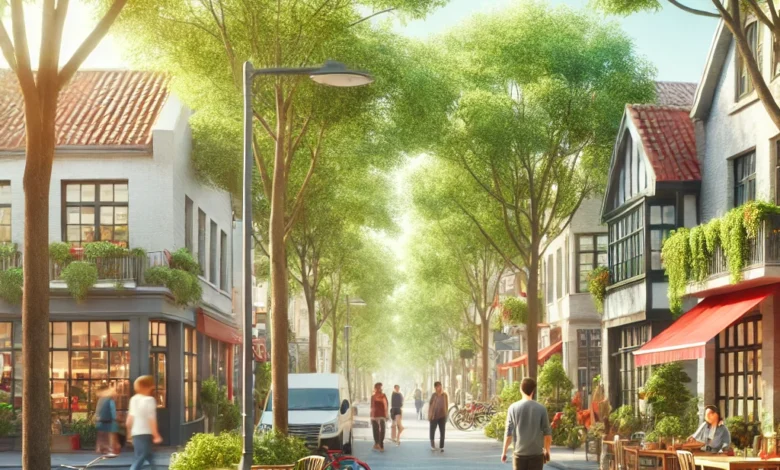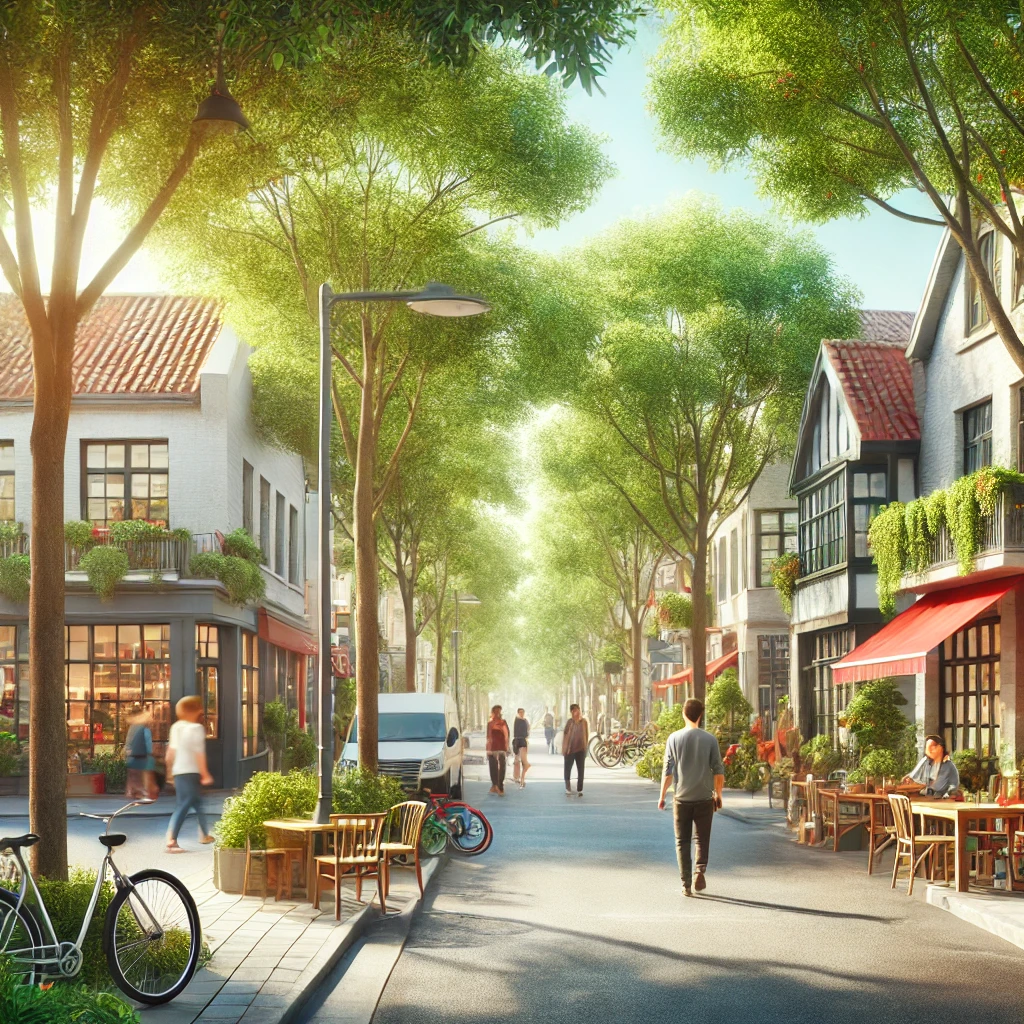Why Everyone is Moving to Smaller Cities (And Should You?)

<
As urban life becomes increasingly hectic, more individuals are rediscovering the charm and benefits of smaller cities. These locales are not just alternatives but haven for those seeking a holistic lifestyle.
The trend of moving to smaller cities is reshaping how we view success. These areas provide a blend of community and opportunity.
Many individuals are finding that moving to smaller cities enhances their quality of life.
This shift is reshaping our definitions of success, making quality of life a priority over traditional metrics such as income or prestige. Cities like Greenville, South Carolina, and Bend, Oregon, exemplify this trend, offering vibrant communities where individuals can thrive.
The way we work, live, and define success is changing—and so are the places we call home. An increasing number of people are choosing to leave the hustle and bustle of major urban centers in favor of smaller cities. Why? Because they’re prioritizing quality of life, health, sustainability, and community.
Whether you’re a remote worker craving work-life balance or someone looking for more sustainability, smaller cities offer a lifestyle worth considering.

The process of moving to smaller cities offers unique opportunities that larger cities often can’t match.
It’s evident that moving to smaller cities can redefine your life experience by prioritizing satisfaction and fulfillment.
This trend is also supported by increased connectivity and technology that allows individuals to work effectively from their chosen location. As businesses adapt to remote work models, the need to live in metropolitan areas diminishes.
For many, moving to smaller cities means embracing a lifestyle that values connection and well-being.
Why Smaller Cities Are Gaining Popularity
For instance, the rise of remote work has allowed professionals to choose locations based on lifestyle rather than proximity to their offices. This freedom enables them to explore smaller cities that offer not only lower living costs but also a higher quality of life.
The decision to consider moving to smaller cities is often influenced by the allure of more affordable living.
Consider the case of a tech worker who transitions from San Francisco to a smaller city like Boise. The decreased cost of housing allows for more disposable income, which can be spent on personal interests, travel, or investing in a home garden—activities that enrich life.
Moreover, technology has made it easier for communities to come together virtually, fostering relationships that would typically require physical presence.
In smaller cities, the commitment to sustainability is a major draw for those considering moving to smaller cities.
Exploring the Benefits of Moving to Smaller Cities
The natural environment in smaller cities greatly enhances the experience for those moving to smaller cities.
1. Shifting Priorities in the Workforce
Ultimately, moving to smaller cities can lead to a more balanced lifestyle focused on wellness.
In smaller cities, you’ll often find community-centered initiatives, such as farmers’ markets or local environmental clean-up days, where residents can come together, make friends, and contribute to their community.
With remote work becoming the norm, professionals are rethinking where they live. Dr. Alex Johnson, urban planning expert, says, “People are rethinking where they work and live, and smaller cities are becoming the obvious choice.”
The focus on sustainable practices is evident in cities that prioritize green spaces, use renewable energy, and promote local businesses committed to eco-friendly practices, significantly lowering their carbon footprints.
Remote work trends prove that work-life balance, not skyscrapers, defines satisfaction.
2. Technology Enables Flexibility
Living in smaller cities often means being closer to nature and having access to outdoor activities like hiking and biking. This lifestyle not only contributes to physical fitness but also enhances mental well-being.
With video calls, cloud tools, and collaborative platforms, it’s easier than ever to work from anywhere. Lifestyle blogger Mark Smith shares, “Smaller cities align with values like sustainability and mental health.”
Wellness initiatives often include community fitness options such as yoga classes in the park or community gardens, promoting a collective approach to health.

This comparison highlights the distinctive advantages of smaller cities, such as lower stress levels and more opportunities for personal growth and community involvement, which can sometimes be overshadowed by the allure of big city life.
It’s essential to recognize the challenges that may arise when transitioning to a smaller city. Developing strategies to navigate these challenges can lead to a fulfilling and successful relocation.
3. Affordable Living Without Compromise
Consider if moving to smaller cities aligns with your personal values for a fulfilling life.
Building a personal network may take time, but engaging in local activities can help bridge the gap. Additionally, many smaller cities have co-working spaces that foster connections among professionals.
Investing in local businesses can enrich your experience and contribute to the local economy, creating a symbiotic relationship that benefits everyone in the community.
Smaller cities offer lower costs for housing, dining, and services. This gives residents the freedom to invest in travel, health, and personal growth—key ingredients of a sustainable wellness lifestyle.
The Environmental and Health Benefits
– **Jason, Software Engineer**: “Relocating to a smaller city didn’t just change my scenery; it transformed my entire lifestyle. The sense of community here is unmatched.”- **Olivia, Graphic Designer**: “I found the inspiration I was missing in the city. Being surrounded by nature rejuvenates my creativity.
”
1. Reduced Carbon Footprints
Smaller cities often prioritize sustainability with low emissions, accessible transit, and walkable designs—ideal for eco-conscious professionals.
Deciding whether to move is a deeply personal choice. Consider your long-term goals and what environment best supports them. Many have found that smaller cities provide the balance they seek.

2. Cleaner Air and Nature Access
Joining online forums and social media groups for specific smaller cities can provide additional insights and support as you navigate your decision-making process.
Consider exploring different regions to find a smaller city that resonates with your values and aspirations. The journey to a more fulfilling life may be closer than you think.
Enjoy clean air, scenic views, and proximity to nature—beaches, trails, and forests. Wellness coach Sarah Lee explains, “Clean air and natural surroundings offer natural remedies for stress.”
3. Wellness-Centered Living
Community-driven wellness initiatives, fitness trails, and slower paces of life improve mental health and reduce burnout.
Big Cities vs. Smaller Cities: Side-by-Side Comparison
| Feature | Big Cities | Smaller Cities |
|---|---|---|
| Cost of Living | High | Affordable |
| Commute Time | Long & stressful | Short & manageable |
| Air Quality | Polluted | Clean & fresh |
| Access to Nature | Limited | High—trails, parks, outdoors |
| Community | Anonymous & fast-paced | Close-knit & supportive |
| Remote Work Support | Moderate | Thriving ecosystems |
Challenges to Consider
It’s not all perfect—here are some limitations and solutions:
Career Gaps: Tech and creative jobs may be limited locally. Solution: Go remote, freelance, or grow an online brand.
Community Culture: Smaller cities may feel close-knit or unfamiliar. Solution: Join local groups, co-working hubs, and events to find your people.
Real Stories, Real Impact
- Emma, Content Creator: “I moved to Asheville. My stress dropped. Nature powers my creativity.”
- Liam, Entrepreneur: “Smaller cities opened up real connections. My business grew faster here than in a metro.”
- Tara, Wellness Blogger: “Boulder is a dream—sustainable brands, eco-living, and a built-in wellness culture.”
Is Moving to a Smaller City Right for You?
From affordability and clean air to deeper connections and better wellness, small cities offer big rewards. Take time to evaluate your values. Is a slower, more intentional life calling?
Take Your Next Step
Research smaller cities aligned with your lifestyle goals. Tap into community groups, wellness trends, and remote work opportunities. You don’t have to do this alone—just do it intentionally.
Explore more ideas: Digital Wellness for Remote Workers
— wp:paragraph –>
As urban life becomes increasingly hectic, more individuals are rediscovering the charm and benefits of smaller cities. These locales are not just alternatives but haven for those seeking a holistic lifestyle.
The trend of moving to smaller cities is reshaping how we view success. These areas provide a blend of community and opportunity.
Many individuals are finding that moving to smaller cities enhances their quality of life.
This shift is reshaping our definitions of success, making quality of life a priority over traditional metrics such as income or prestige. Cities like Greenville, South Carolina, and Bend, Oregon, exemplify this trend, offering vibrant communities where individuals can thrive.
The way we work, live, and define success is changing—and so are the places we call home. An increasing number of people are choosing to leave the hustle and bustle of major urban centers in favor of smaller cities. Why? Because they’re prioritizing quality of life, health, sustainability, and community.
Whether you’re a remote worker craving work-life balance or someone looking for more sustainability, smaller cities offer a lifestyle worth considering.

The process of moving to smaller cities offers unique opportunities that larger cities often can’t match.
It’s evident that moving to smaller cities can redefine your life experience by prioritizing satisfaction and fulfillment.
This trend is also supported by increased connectivity and technology that allows individuals to work effectively from their chosen location. As businesses adapt to remote work models, the need to live in metropolitan areas diminishes.
For many, moving to smaller cities means embracing a lifestyle that values connection and well-being.
Why Smaller Cities Are Gaining Popularity
For instance, the rise of remote work has allowed professionals to choose locations based on lifestyle rather than proximity to their offices. This freedom enables them to explore smaller cities that offer not only lower living costs but also a higher quality of life.
The decision to consider moving to smaller cities is often influenced by the allure of more affordable living.
Consider the case of a tech worker who transitions from San Francisco to a smaller city like Boise. The decreased cost of housing allows for more disposable income, which can be spent on personal interests, travel, or investing in a home garden—activities that enrich life.
Moreover, technology has made it easier for communities to come together virtually, fostering relationships that would typically require physical presence.
In smaller cities, the commitment to sustainability is a major draw for those considering moving to smaller cities.
Exploring the Benefits of Moving to Smaller Cities
The natural environment in smaller cities greatly enhances the experience for those moving to smaller cities.
1. Shifting Priorities in the Workforce
Ultimately, moving to smaller cities can lead to a more balanced lifestyle focused on wellness.
In smaller cities, you’ll often find community-centered initiatives, such as farmers’ markets or local environmental clean-up days, where residents can come together, make friends, and contribute to their community.
With remote work becoming the norm, professionals are rethinking where they live. Dr. Alex Johnson, urban planning expert, says, “People are rethinking where they work and live, and smaller cities are becoming the obvious choice.”
The focus on sustainable practices is evident in cities that prioritize green spaces, use renewable energy, and promote local businesses committed to eco-friendly practices, significantly lowering their carbon footprints.
Remote work trends prove that work-life balance, not skyscrapers, defines satisfaction.
2. Technology Enables Flexibility
Living in smaller cities often means being closer to nature and having access to outdoor activities like hiking and biking. This lifestyle not only contributes to physical fitness but also enhances mental well-being.
With video calls, cloud tools, and collaborative platforms, it’s easier than ever to work from anywhere. Lifestyle blogger Mark Smith shares, “Smaller cities align with values like sustainability and mental health.”
Wellness initiatives often include community fitness options such as yoga classes in the park or community gardens, promoting a collective approach to health.

This comparison highlights the distinctive advantages of smaller cities, such as lower stress levels and more opportunities for personal growth and community involvement, which can sometimes be overshadowed by the allure of big city life.
It’s essential to recognize the challenges that may arise when transitioning to a smaller city. Developing strategies to navigate these challenges can lead to a fulfilling and successful relocation.
3. Affordable Living Without Compromise
Consider if moving to smaller cities aligns with your personal values for a fulfilling life.
Building a personal network may take time, but engaging in local activities can help bridge the gap. Additionally, many smaller cities have co-working spaces that foster connections among professionals.
Investing in local businesses can enrich your experience and contribute to the local economy, creating a symbiotic relationship that benefits everyone in the community.
Smaller cities offer lower costs for housing, dining, and services. This gives residents the freedom to invest in travel, health, and personal growth—key ingredients of a sustainable wellness lifestyle.
The Environmental and Health Benefits
- Jason, Software Engineer: “Relocating to a smaller city didn’t just change my scenery; it transformed my entire lifestyle. The sense of community here is unmatched.”
1. Reduced Carbon Footprints
- Olivia, Graphic Designer: “I found the inspiration I was missing in the city. Being surrounded by nature rejuvenates my creativity.”
Smaller cities often prioritize sustainability with low emissions, accessible transit, and walkable designs—ideal for eco-conscious professionals.
Deciding whether to move is a deeply personal choice. Consider your long-term goals and what environment best supports them. Many have found that smaller cities provide the balance they seek.

2. Cleaner Air and Nature Access
Joining online forums and social media groups for specific smaller cities can provide additional insights and support as you navigate your decision-making process.
Consider exploring different regions to find a smaller city that resonates with your values and aspirations. The journey to a more fulfilling life may be closer than you think.
Enjoy clean air, scenic views, and proximity to nature—beaches, trails, and forests. Wellness coach Sarah Lee explains, “Clean air and natural surroundings offer natural remedies for stress.”
3. Wellness-Centered Living
Community-driven wellness initiatives, fitness trails, and slower paces of life improve mental health and reduce burnout.
Big Cities vs. Smaller Cities: Side-by-Side Comparison
| Feature | Big Cities | Smaller Cities |
|---|---|---|
| Cost of Living | High | Affordable |
| Commute Time | Long & stressful | Short & manageable |
| Air Quality | Polluted | Clean & fresh |
| Access to Nature | Limited | High—trails, parks, outdoors |
| Community | Anonymous & fast-paced | Close-knit & supportive |
| Remote Work Support | Moderate | Thriving ecosystems |
Challenges to Consider
It’s not all perfect—here are some limitations and solutions:
Career Gaps: Tech and creative jobs may be limited locally. Solution: Go remote, freelance, or grow an online brand.
Community Culture: Smaller cities may feel close-knit or unfamiliar. Solution: Join local groups, co-working hubs, and events to find your people.
Real Stories, Real Impact
-
- Emma, Content Creator: “I moved to Asheville. My stress dropped. Nature powers my creativity.”
-
- Liam, Entrepreneur: “Smaller cities opened up real connections. My business grew faster here than in a metro.”
-
- Tara, Wellness Blogger: “Boulder is a dream—sustainable brands, eco-living, and a built-in wellness culture.”
Is Moving to a Smaller City Right for You?
From affordability and clean air to deeper connections and better wellness, small cities offer big rewards. Take time to evaluate your values. Is a slower, more intentional life calling?
Take Your Next Step
Research smaller cities aligned with your lifestyle goals. Tap into community groups, wellness trends, and remote work opportunities. You don’t have to do this alone—just do it intentionally.
Explore more ideas: Digital Wellness for Remote Workers

